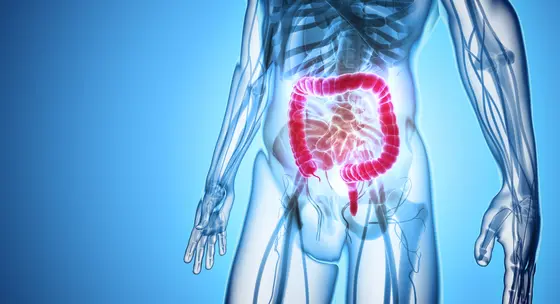When the conversation is about colon cancer screening, physicians often ask their patients about cancer cases among close family members. Colorectal cancer in first-degree relatives is considered a known risk factor for the disease. Besides family history, a person's profile of genetic risk markers also provides information about his or her personal cancer risk. This scientific term refers to very small gene variants (called single nucleotide polymorphisms), each of which, taken on its own, has only minimal relation to the probability of suffering disease. Taken together, however, they have a significant impact.
“It is a widely held notion that genetic risk profile and family history essentially both provide the same, redundant information,“ says Hermann Brenner, an expert for colorectal cancer prevention from the DKFZ. In a current study, Brenner has now modified this concept and has proven that it is beneficial to use both information sources in combination.
Korbinian Weigl, an epidemiologist who is the first author of the study, analyzed the family history and, in a parallel effort, a panel of 53 known genetic risk markers in approximately 4,500 participants of the DACHS* study. About half of the cases studied were colorectal cancer patients. Weigl discovered that the two factors deliver largely independent results:
- The risk for disease in participants with colorectal cancer cases in first-degree relatives was about twice as high as that of participants with no family history of bowel cancer.
- The risk for disease in the group of participants with the largest numbers of genetic risk markers in their genomes was three times higher than that of study participants with the smallest numbers of risk variants.
- The risk in participants with a positive family history who also display numerous genetic risk markers multiplied: Colorectal cancer is six times as prevalent in them as in people who have no family history of bowel cancer and exhibit only small numbers of risk markers in their genomes.
- No significant association was found between the numbers of genetic risk variants and family history.
“People often assume that familial colorectal cancer is primarily related to genetic predisposition,“ Brenner said. “This is true in a small proportion of colorectal cancer cases, particularly those with onset at early age.“ However, in the majority of colorectal cancer cases, this is not the case. Brenner thinks this might be due to the fact that cancer cases in the family primarily reflect common non-genetic factors such as smoking or a physically inactive lifestyle.
In addition, large numbers of genetic risk markers increase the risk of developing cancer in people with and without a family history of bowel cancer alike.
“The result clearly shows us that the combination of both factors has the potential to make risk prediction for colorectal cancer significantly more precise,“ Brenner sums up. “The more accurately we can predict a person's risk, the better we can adjust preventive measures. For people with high risks, for example, it would be beneficial to start colorectal cancer screening much earlier than at age 50.“
The DACHS study is an epidemiological case-control study of the German Cancer Research Center (DKFZ). DACHS is an abbreviation for “Darmkrebs: Chancen der Verhütung durch Screening“ (Colorectal cancer: chances for prevention through screening). DACHS is one of the largest population-based case-control studies worldwide. For more information see also: http://dachs.dkfz.org/dachs/
Korbinian Weigl, Jenny Chang-Claude, Phillip Knebel, Li Hsu, Michael Hoffmeister, Hermann Brenner: Strongly enhanced colorectal cancer risk stratification by combining family history and genetic risk score.
Clinical Epidemiology 2018, DOI: 10.2147/CLEP.S145636
A picture is available for download: Fotolia_139480276_L.jpg
Note on use of images related to press releases
Use is free of charge. The German Cancer Research Center (Deutsches Krebsforschungszentrum, DKFZ) permits one-time use in the context of reporting about the topic covered in the press release. Images have to be cited as follows: “Source: Yodiyim, Fotolia“.
Distribution of images to third parties is not permitted unless prior consent has been obtained from DKFZ's Press Office (phone: ++49-(0)6221 42 2854, E-mail: presse@dkfz.de). Any commercial use is prohibited.



